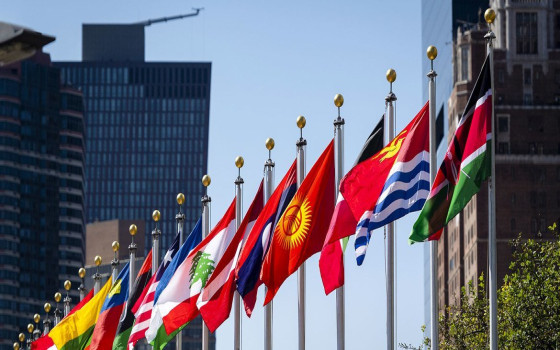
An unprecedented week at the United Nations: World leaders are exploring ways to enhance sustainability...in 5 areas: debt, tourism, transportation, infrastructure, and energy.

- Europe and Arabs
- Tuesday , 16 April 2024 13:7 PM GMT
New York: Europe and the Arabs
In an event that is the first of its kind, the United Nations General Assembly is organizing Sustainability Week, a week-long series of events that brings together world leaders to explore and promote global sustainability measures in 5 areas: debt, tourism, transportation, infrastructure, and energy. According to what was stated in the United Nations daily news bulletin. We received a copy of it Tuesday morning
She added that yesterday, Monday, the General Assembly Hall witnessed a high-level thematic discussion on debt sustainability and social and economic equality for all. President of the United Nations General Assembly, Denis Francis, said that the event will focus on the consequences of emerging debt on the development paths of countries, especially those in special situations such as least developed countries, landlocked developing countries and small island developing states.
In addition to Mr. Francis, the Secretary-General of the United Nations, António Guterres, delivered a speech at the opening session, in addition to Ms. Paula Narváez, President of the Economic and Social Council, and Achim Steiner, Administrator of the United Nations Development Programme.
Today, Tuesday, a high-level thematic event on tourism is being held. Tomorrow, Wednesday, a high-level meeting will be held on sustainable transport. On Thursday, an informal dialogue will be held on building global resilience and promoting sustainable development through connected infrastructure.
The week concludes on Friday with a global assessment marking the conclusion of the United Nations Decade on Sustainable Energy for All, with the aim of further accelerating the implementation of Goal 7 of the Sustainable Development Goals, which relates to ensuring access to clean and affordable energy.
A call to save developing countries from the burden of debt
United Nations Secretary-General António Guterres said that “the global financial system is broken, but it can be repaired,” stressing that the world cannot continue to throw the plans and futures of developing countries onto a “burning fire of debt.”
This came during his speech at the high-level thematic discussion held in the General Assembly Hall on debt sustainability and social and economic equality for all.
Mr. António Guterres called for us to seize this opportunity to forge a more effective and just multilateral system - one that responds to the needs of today's world with agility, compassion and, above all, justice.
He said that there is no clearer example of the failure of the international financial structure than the way it deals with debt, noting that the past four years have been nothing less than a "debt disaster." He explained that developing countries already face bias from credit rating agencies, while paying much higher interest rates compared to developed countries.
According to the Secretary-General, interest rates have risen to dangerous levels in the post-Covid-19 pandemic period, with development plans drowned by a “tsunami” of debt servicing costs. Countries face impossible, even heartbreaking, decisions about how to allocate funding.
Guterres said that in 25 developing countries, more than a fifth of tax revenues go to servicing external debt. Borrowing costs are very high, and 3.3 billion people - about 40% of the population - live in countries that spend more on interest payments than on health or education.
The Secretary-General warned that any development financing flowing to countries “is quickly dissolved by the acids of interest rates and unforgiving debt service payments.” “In fact, in 2022, 52 developing countries paid a total of $49 billion more to external creditors than they received in new payments.”
Over the past three years alone, the world has witnessed 18 sovereign debt defaults in ten developing countries – the highest in two decades. Thirty-four of the poorest countries are either in debt distress or at high risk of debt distress, according to the Secretary-General.
“For developing countries, debt means a world of pain,” he added. “They are struggling to climb the development ladder with one hand tied behind their back.”
Two actions are necessary
The Secretary-General said that developing countries need a lifeline to pull themselves out of the quicksand of debt.
First, take action to stimulate sustainable development goals. In this regard, Guterres said that we must work significantly to increase affordable and long-term financing. He stressed the need to work with multilateral development banks, central banks, and credit rating agencies to grant a greater volume of low-cost lending provided by multilateral development banks to support developing countries as they invest in development. He renewed his call to creditors to explore the possibility of deferring debt payments for vulnerable countries. While the International Monetary Fund called for temporarily suspending additional interest rate fees at this time of tight liquidity.
Second, a comprehensive overhaul of the global financial architecture and, specifically, its approach to debt. The Secretary-General said that we must find new ways to enable countries to borrow boldly and sustainably in times of need, noting that we must work to increase the representation of developing countries across the system and in every decision that is taken.
He said that the Future Summit next September and the Financing for Development Conference next year represent critical moments for making progress on these ideas, closing long-term gaps in the global debt structure, and achieving justice for developing countries.












No Comments Found